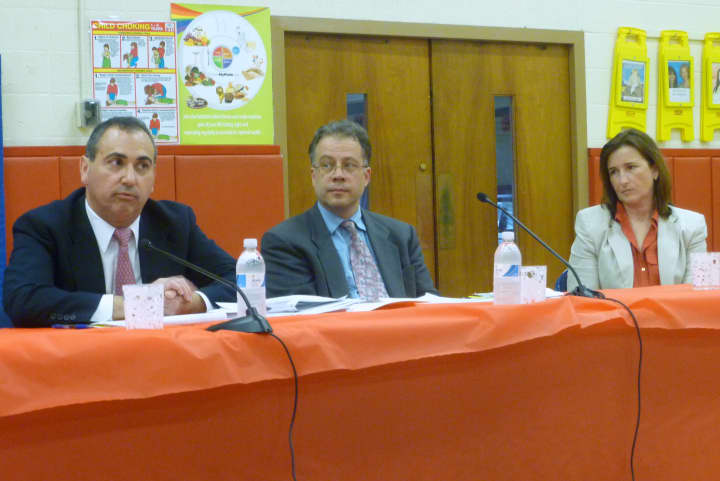Four candidates are vying for three open seats on the Board of Education: incumbent Vincent Nadile, Carol Banino, John Paine and Jennifer Liddy Green. Check back as Election Day draws closer to see more candidate questionnaires.
John Paine works for the New York Power Authority. Paine and his wife have been a resident of Tarrytown for 11 years, with one child already in the Public Schools of the Tarrytowns and another approaching school age.
What qualifies you to be a school board member? A keen and deep interest in improving the schools, strengthening our community and a track record of board meeting attendance as a citizen and a regular commenter in the board proceedings. I speak with a certain amount of pride that both Vince (Nadile) and I have been to about the same number of board meetings over the last 3 years. I understand the board and its workings, the processes and policies they operate under, and the history of the last three-plus years of the district.
In addition I am active within the community, particularly with regard to the Old Dutch Church and its relationship with Historic Hudson Valley, hearing loss awareness programs, and am a regular blood donor (and urge all others who are able to join me).
-
What would you like to accomplish if elected?
Restore lower grade level TAs and teaching staff as soon as possible
-
Incorporate a heightened sense of fiscal responsibility while preserving the programs that make our school system great.
-
Bolster emphasis in STEM-area classes (science, technology, engineering and math).
-
Develop a solid grass-roots effort to reform the state education policies that are hampering good-faith efforts to make education about the children.
If something had to be cut from the budget to meet the state tax cap, what would you cut? This is actually a leading question in two manners: one, it pre-supposes that the school board will stick completely to the tax cap without regard to the damage it causes to the schools, the teachers, the children and the community; and, two, it assumes that there is a “magic bullet” to fix the increase in taxes with a single cut. If there is anything I have learned about the budgeting process over the last three years, it is that no single addition, deletion or change in any aspect of the budget will resolve such a challenge.
As I think all four of us as candidates (and parents) would agree, the “low-hanging fruit” has all been picked at this point. Should the board decide not to offer to the public a budget above the cap, we would be forced into considering deeper cuts to the very things that one segment of parents or another have strongly indicated opposition to: layoffs of teachers, cutting administrative staff such as principals or support staff, fewer electives, fewer AP classes, loss of sports or non-Common Core classes, or other equally distasteful options. I cannot assume that anything is off of the table at that point, and this remains a severe challenge to the standing of schools in the future.
What are the three biggest issues facing the school today?
- Many people have remarked on their concerns about non-resident students and the impact on school costs
- Fiscal responsibility
- Preserving good programs that help students succeed
If elected what would you do about them?
1. Non-resident students, and how much they cost the district: It is important to remember that their cost to the district is often expressed in “per-pupil cost” on the order of $20,000-plus a year, but the elimination of a single student does not bring $20,000 in immediate savings. Consider this: let’s say that one high-school student is removed. The result is one less person in 7-9 classes, but the drop in class size doesn’t reflect a corresponding decrease in the number of teachers or building heating or air conditioning costs. There is a relatively small savings in textbook costs and other supplies, but how significant that is in relation to the “per-pupil cost” is very small.
The true cost is in the capacity of the staff to address the needs of the others students. A reduction across the system of 20-30 non-resident students (if there are that many) may not change the taxes that we pay to support the schools, but would materially improve the education of the rest of the student body. It is worth pursuing within the context of uniform and regular “re-registration”.
2. Fiscal responsibility: Fiscal responsibility is a journey, not a destination. Continuing the work that the school board has put in so far and continuing to strive to reduce costs, extend the useful working life of capital projects and buildings, and make long-term careful investments in programs and infrastructure that will yield decreasing costs over time rather than short-sighted cuts that eventually incur greater costs in the future is a necessity for the board, especially over the next few years. Bringing special education professionals in-system to reduce overall costs across the district while increasing the effectiveness of services, maintaining summer classes in order to serve our students while offsetting the program costs by tuition received from other districts for placement.
3. Program preservation. AP, challenge classes, emphasis on multilingual teachers, administrators and other staff, and of course, reincorporating sufficient staffing at the beginning grades (K, 1 and maybe even 2). All of these are recognized as “winners” for the edge they give our schools in a cost-effective manner, and should be preserved.
As a last comment I would like to appeal to the community as I did “Meet the Candidate” evening at John Paulding on Tuesday: come to the school board meetings – make your voices heard. Whether I am at the table or in the audience, I’ll see you there!
Click here to follow Daily Voice Tarrytown-SleepyHollow and receive free news updates.


